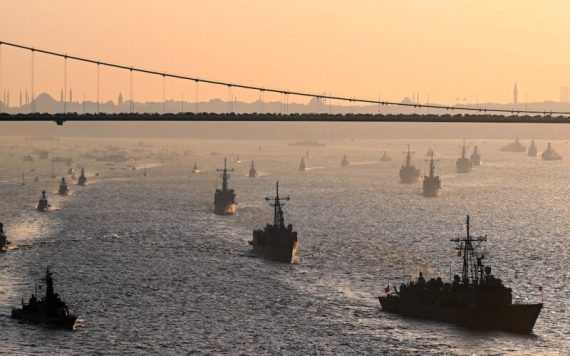T
he century-long development journey of the Turkish defense industry can be characterized by its pioneering actors and decisive breaking points. The developmental phases of the Turkish defense industry can be outlined in the following phases: (i) Early Republican era (1923-1950), (ii) NATO accession (1952-1964), (iii) the Cyprus Peace Operation (1964-1978), (iv) embargoes on the Turkish defense industry (1980-1990, (v) change in domestic and foreign procurement models (1990-2002), and (vii) the final development phase of the Turkish war industry 2003-2023.
First Steps
The importance of the first phase (1923-1950) lies in the awareness of Mustafa Kemal Atatürk, the founder of the new republic after its heroic liberation struggle, who encouraged self-reliance in national self-defense by developing military skills and capabilities with domestic and national resources. The legacy inherited from the Ottoman Empire, the century-old Sevres conspiracy of the Great Powers, and the transformative impact of World War I on military technology and the arms race played an important role in this consciousness.
For this reason, on the one hand, Atatürk adopted a “peaceful” rhetoric in foreign, security, and defense policies with the principle of “Peace at home, Peace in the world”, and, on the other, he considered the formation of a land, air, and naval war industry as essential for the political, military, diplomatic, and economic rights and interests of the country.
With his instructions, the small arms and cannon repair ateliers, and cartridge and carpentry facilities were gathered under the umbrella of the General Directorate of Military Factories, which was established in 1921 and transferred to the Mechanical and Chemical Industry Corporation (MKEK) in 1950. This initiative accelerated the activities of the arms, ammunition, and chemical factories.
Another distinctive feature of Atatürk’s era was the encouragement of private sector entrepreneurship. Revolutionary names such as Nuri Demirağ and Vecihi Hürkuş, as well as the Turkish Aeronautical Association (THK) and the Turkish Aircraft, Automobile and Engine Limited Company (Tayyare, Otomobil ve Motor Türk Anonim Şirketi, TOMTAŞ), which are today cited as pioneering actors in the history of the Turkish defense industry, are products of the early Republican period.
Likewise, the Gölcük Shipyard, the largest facility of the naval warfare industry today, was established based on the decision to found the Naval Base in Gölcük with Law No. 2173 approved by the Turkish Grand National Assembly in May 1933. However, despite the attempts made during this period, Turkey continued to procure weapons from abroad.
The reason for foreign defense procurement was the desire, on the one hand, not to burden the state with the new enterprises, and, on the other, the time that was required for Turkish companies to reach the technological level to meet the needs of a more modern Turkish Armed Forces (TAF) and to move to the mass production stage. Meanwhile, following Atatürk’s death and World War II, the Turkish warfare industry entered a period of stagnation.
While the destructiveness of the war and its impact on the world economy put many countries into financial bottlenecks, the East-West struggle centered on the Soviet Union and the U.S. was instrumental in strengthening Turkey’s warfighting capability and capacity, while at the same time sowing the seeds of a long-lasting “dependency.”
In the face of a Soviet threat, the U.S. not only supplied Turkey, which it had promoted to a strategic ally, with large quantities of weapons, equipment, and vehicles, but also sought to impose American doctrinization by providing financing, training, and logistical support to dominate the military, intelligence, and technical spheres. Turkey thus evolved into a country dependent on large-scale financial and military support provided by the U.S. under the Truman Doctrine (Mutual Defense Assistance Act) and the Marshall Plan (officially, European Recovery Program).
The first determinant of the second phase (1952-1964) was Turkey’s NATO membership in 1952. NATO membership not only positioned Turkey under the alliance’s security umbrella, but also expanded and deepened its dependence on the “NATO defense market.” Moreover, Turkey relied on NATO in many aspects ranging from the defense industry to military and defense diplomacy, reinforcing the decisive role of NATO engagements in its foreign, security, and defense policies.
The second turning point of this period manifests the extent to which Turkey’s role in NATO had a major impact on the country’s decisions. In 1964, President Johnson’s letter to Prime Minister İnönü was a declaration that Turkey would not be able to use any weapons and equipment provided by the U.S. and NATO if Turkey’s policies and interests in Cyprus were at odds with those of its Western allies. In light of such criticism and threats, the Cyprus Peace Operation could not be carried out until 10 years later.
The third phase (1964-1978) was characterized by the Cyprus Peace Operation in 1964 and the subsequent arms embargo imposed by the U.S. until 1978. With the so-called Johnson Letter Turkey once again realized how vital it was for its national security and interests that it establishes a war industry and maintains it with national sources.
In fact, this bitter experience was not only about the shortage of spare parts and logistical support for the TAF; it also led to the realization of how quickly Turkey’s foreign policy decisions could isolate it from its regional alliances, with which it had developed high-level and multiple engagements.
Thus, Turkey once again turned to indigenous initiatives, this time in a more institutionalized and industrialized manner. The Air, Naval and Land Forces Foundations (Turkish Armed Forces Foundation as of 1987) and companies such as Turkish Aerospace Industries (TUSAŞ or TAI in English), ASELSAN, a defense electronics company, Rocketsan, a rocket and missile manufacturer and defense contractor, and HAVELSAN, a software and systems company, which are the leading institutions and organizations of the Turkish defense industry today, were born in the 1970s.
The fourth phase (1980-1990) of the Turkish defense industry was characterized by overt and covert embargoes. Turkey’s counterterrorism operations against the PKK—as well as its Syrian offshoot, the PYD/YPG today—often lacked support from its NATO and European allies, who introduced new procedures and decisions that made it difficult for Turkey to use the weapons, ammunition, and equipment that Turkey had procured from them.
However, as a result of the lessons learned from the 1970s, Turkey entered the 1980s with a higher level of awareness which led to institutionalization efforts to achieve a more modern defense industry, first with the establishment of the Presidency of Defense Industry Development and Support Administration (SAGEB) in 1985 and then the Undersecretariat for Defense Industries (SSM) in 1989.
Another important aspect of this period is that, despite all the political conflicts of interest and challenging economic conditions, Ankara highly valued cooperation, and in this sense, the joint establishment by the U.S. and Turkey of Turkish Aerospace Industries (TAI) and TUSAŞ Engine Industries (TEI) provided an extremely important theoretical and technical input to the domestic defense industry.
The fifth phase (1990-2002) saw a change in domestic and foreign procurement models thanks to this institutionalization. In this context, Turkey’s procurement trend shifted from smart supply to production under license, co-production, technology transfer, and cooperation.
While the F-16 project was valued as an important acquisition of knowledge and experience, new projects were initiated by the Turkish Armed Forces Foundation companies from this accumulation and capability enhancement.
The indigenization of the defense discourse
The sixth and final development phase (2003-2023) of the Turkish war industry is the period from the beginning of the 21st century to the present day. The defining characteristic of this period is the defense industry discourse of the AK Party, which has been in power for the last 20 years, and which has been widely featured in both the party charter and election manifestos.
This discourse is based on the pursuit of indigenization, nationalization, and strategic autonomy, and subsequently took on a more robust face with the “National Technology Initiative.” A Defense Industry Executive Committee (SSİK) meeting in 2004 represented the first breaking point in these discourses and practices. In this meeting, it was decided to cancel many foreign procurement projects that were already on the table, and to develop the new procurement structure, which was envisioned to be applied to many old projects whose seeds were sown in the 1990s, by maximizing the support of domestic resources and capabilities. In the new period, Turkey has given higher priority to indigenous design and R&D models, taking advantage of co-production, technology transfer, and cooperation models.
This revolutionary decision initially raised some concerns about meeting the needs of the TAF in a timely manner and with competent technology. However, the projects that were realized in a short period of time, and the platforms that were quickly brought into the national inventory and put into the development phase with feedback from the field, gained the confidence of the TAF.
In this context, the operational experience gained through negative and positive feedback on the product performance of the weapons and equipment used by the TAF, from Operation Euphrates Shield to Operation Spring Shield and Operation Claw to Operation Winter Eagle, has strengthened Turkey’s self-defense capacity with each passing day.
In short, this process has witnessed Turkey deepen its knowledge, experience, and capability acquisition in many areas such as land, naval, and air platforms, laser weapons, unmanned vehicles, material technology, information and communication systems, and electronic warfare.
Looking at the current state of the Turkish defense industry, three developments are striking. First, the principles of “indigenous” and “national” adopted in the defense industry have now evolved into a national technology move that embraces all branches of industry. This development has become an incentive for enterprises utilizing domestic and national resources in all branches of industry. In other words, the “national technology mindset” permeated civilian technologies as well. Moreover, this mental transformation led to a restructuring that established a more interactive and stronger relationship between the state, industry, and academia.
Recommended
Second, the positive developments in the defense industry have gone beyond meeting the needs of the TAF and turned into critical exports for a country that has adhered to the concept of “strong state, strong army” since the days of the Ottoman Empire.
For example, Baykar, currently one of the leading players in the global UAV market, has not only created a multiplier effect in terms of the operational capabilities and strategic gains of the TAF, but has also become an export champion, generating a significant source of employment with its ever-expanding product range and contracting with 32 countries.
Third, the defense industry has become an integral component of Ankara’s foreign, security, and defense policies. In this way, Turkey has strengthened its defensive/offensive capacity, and gained different arguments and advantages in terms of deterrence, negotiation, and bargaining. This has enabled Turkey, which prioritizes a proactive foreign policy approach, to assume a stronger and more effective role in non-traditional diplomatic activities such as military diplomacy, defense diplomacy, defense industry diplomacy, and science and technology diplomacy, both in bilateral relations and in regional and international organizations.





